Public Research Reports & Publications
While custom market research makes up a substantial portion of our business, we’re probably best known for our public and industry research reports. These reports present benchmark research that has informed the debate on a range of national policy issues.
Scroll down to explore our reports
Most reports are free thanks to the generosity of our partners.
| |
|
|
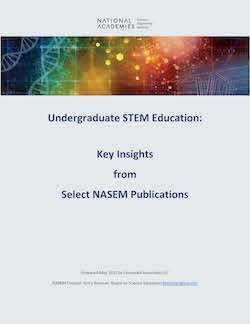 |
|
2022
Higher education’s challenges — and potential opportunities — are accelerating. We explored these trends when our long-time clients at the National Academies of Sciences, Engineering and Medicine asked us to generate key insights from a series of detailed Academies studies. We analyzed and distilled findings from publications that focused on systemic change in higher education including the learner experience, teaching, diversity, technology and innovation.
|
| |
|
|
| |
|
|
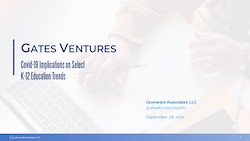 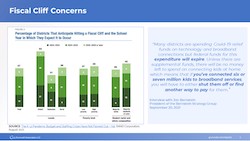 |
|
2021
Gates Ventures asked us to review existing research on COVID’s impact on K-12 education in the U.S. We conducted this work in the summer and fall of 2021, and focused on a few key issues such as funding, student attrition, the teacher work force, and student wellbeing. This deck summarizes some of the findings from our research scan.
|
| |
|
|
| |
|
|
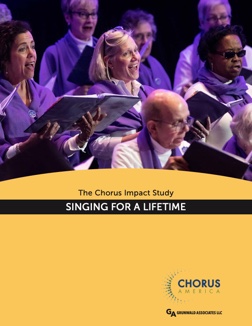 |
|
2019
Conducted with Chorus America, this study examines the perceived benefits of singing for adults, including mental health and civic engagement. It builds on our 2009 Chorus Impact Study which focused on children as well as adults; we now look in-depth at the role that singing plays in the lives of older adults. To facilitate comparisons for our new study, we conducted parallel surveys of choral singers, older singers, the general public, and seniors. Our samples included a total of 6,800 respondents. Funding was provided by the National Endowment for the Arts, the National Association of Music Merchants, and other supporters.
|
| |
|
|
| |
|
|
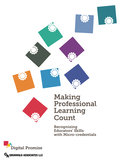 |
|
2015
Recognizing Educators’ Skills with Micro-credentials
Our public study report on teacher professional development and micro-credentials, conducted with Digital Promise. The study informs creation of new professional development and micro-credentialing programs by focusing on the teacher perspective. It was based on a survey using a nationally representative sample of 856 teachers. Topics covered include teacher awareness of micro-credentials, teacher interest in micro-credentials, and the relationship between micro-credentials and professional development.
|
 |
|
Corporate Data License
A much more detailed market research report based on findings from Making Professional Learning Count is available for corporate licensing Learn more about our commercial report: Teacher Micro-credential & Professional Development Study.
|
| |
|
|
| |
|
|
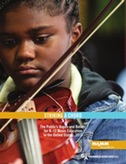 |
|
2015
The Public’s Hopes and Beliefs for K–12 Music Education in the United States: 2015
Our public study on music education, conducted with the National Association of Music Merchants (NAMM). The study informs the national debate around curriculum priorities by focusing on parent and teacher attitudes towards music education. It was based on a survey using nationally representative samples of 1,000 teachers and 800 students. Topics covered include the benefits of music education, trade-offs between music education and other subjects, and identifying supporters of music education and funding.
|
 |
|
Corporate Data License
A deeper look into findings of interest to business is available through our detailed Music Education Market Research Report.
|
| |
|
|
| |
|
|
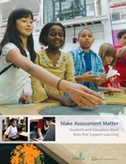 |
|
2014
Students and Educators Want Tests that Support Learning
Based on large national surveys of students, teachers, and school district administrators, we looked at uses, perceptions and aspirations around education assessment. This study, conducted with NWEA, is one of the only efforts to bring the voice of students into the national assessment debate.
|
 |
|
Corporate Data License
A much more detailed market research report based on findings from our Make Assessment Matter is available for corporate licensing. Learn more
|
| |
|
|
| |
|
|
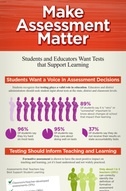 |
|
2014
Can be distributed on its own or in conjunction with the full public report.
|
| |
|
|
| |
|
|
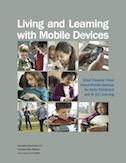 |
|
2013
What Parents Think About Mobile Devices for Early Childhood and K-12 Learning
In partnership with LFA and with the support of AT&T, this report examines how parents perceive the value of mobile devices, how they see their children actually using family-owned mobiles for productive (and not so productive) purposes, and what parents think of the possibilities.
Corporate Data License
A much more detailed market research report based on findings from our mobile survey is available for corporate licensing. (The Living & Learning with Mobile Devices public report contains summary information of interest to educators and policy makers.) The corporate package includes over 1,000 pages of data, and a 100+ page presentation-style report. Learn more.
|
| |
|
|
| |
|
|
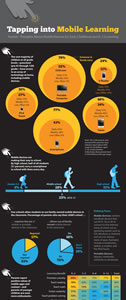 |
|
2013
This informative infographic highlights findings from Living and Learning with Mobile Devices, sharing key data about ownership, use and learning benefits of mobile devices as reported by parents. This impactful visual tool can be distributed on its own or in conjunction with our full report.
|
| |
|
|
| |
|
|
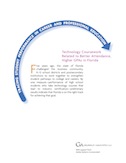 |
|
2012
Industrial-era “vocational education” is being transformed into more robust career and technical education (CTE), aiming to integrate academic, employability and technical skills. In order to better understand the relationship between CTE courses and student outcomes, we analyzed Florida’s Career and Professional Education program data provided by the Florida State Department of Education. Available in standard resolution format and high resolution format for printing.
|
| |
|
|
| |
|
|
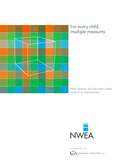 |
|
2012
After a decade of increased high-stakes testing, the world of education assessment is undergoing dramatic changes. What do parents, teachers and district administrators really want from assessments? To address these and related questions, we partnered with NWEA to survey large representative samples of parents, teachers, and district decision makers. Our report, “For Every Child, Multiple Measures,” examines attitudes and needs of each of these groups, including perceived benefits and costs of different types of assessment.
|
| |
|
|
| |
|
|
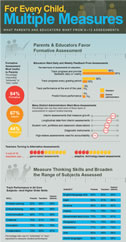 |
|
2012
Key findings from the NWEA -- Grunwald Education Assessment Study are showcased in this high impact infographic. It is intended as a visual tool to communicate critical data, including what subjects / skills parents and educators want assessed – and how. It can be distributed on its own or in conjunction with our full report.
|
| |
|
|
| |
|
|
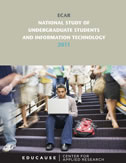 |
|
2011
We created this report with EDUCAUSE, based on our survey of college student technology use and attitudes for EDUCAUSE. In addition to student technology use, we explored undergraduate views on how -- and how well -- their institutions are integrating technology. Survey responses were gathered from a nationally representative sample of 3,000 students in 1,179 colleges and universities.
|
| |
|
|
| |
|
|
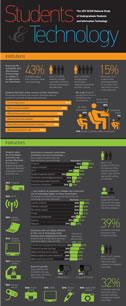 |
|
2011
Our stand-alone infographics provide a highly visual complement to our research reports. This infographic for EDUCAUSE highlights key findings on institutions, hardware and software.
|
| |
|
|
| |
|
|
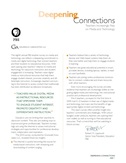 |
|
2011
A summary of findings from the eighth Annual PBS Survey of Education Media & Technology conducted by Grunwald Associates LLC. The study examines Pre-K-12 educators’ use of — and demand for — media and technology.
The PBS News Release is also available. |
| |
|
|
| |
|
|
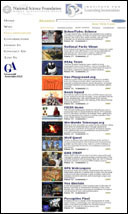 |
|
2011
Informal Science Learning
On behalf of the National Science Foundation, we built and maintained an online community and website featuring case studies and contributions / comments from leading informal science educators, researchers and policy makers. |
| |
|
|
| |
|
|
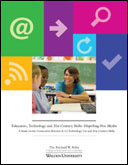 |
|
2010
Sponsored by Walden University (part of Laureate Education). This report explores the interplay between technology and a variety of key educational objectives. It presents finding from a national survey of teachers and administrators commissioned by Walden. |
| |
|
|
| |
|
|
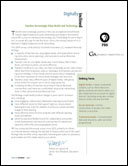 |
|
2010
A summary of findings from the seventh Annual PBS Survey of Education Media & Technology conducted by Grunwald Associates LLC. The study examines K-12 educators’ use of — and attitudes towards — media and technology. And for the first time, this year’s survey was expanded to include Pre-K educators.
The PBS News Release is also available. |
| |
|
|
| |
|
|
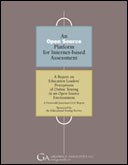 |
|
2010
Sponsored by the Educational Testing Service.
This report synthesizes findings from a study we conducted, which included over 80 interviews with state education technology and assessment decision-makers (representing 27 states) along with national education opinion leaders. |
| |
|
|
| |
|
|
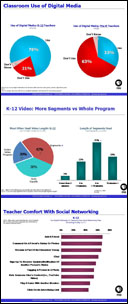 |
|
2010
A presentation delivered at the TED Conference session hosted by the National School Boards Association at the Consortium for School Networking Annual Conference. |
| |
|
|
| |
|
|
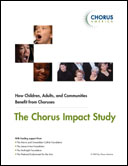 |
|
2009
A report based on a multi-part study we conducted for Chorus America which looked at the impact of Choruses on Children, Adults, and Communities. We surveyed the attitudes, opinions, and activities of more than 2,000 singers in choruses of all kinds, 500 members of the general public, 500 parents, and 300 K-12 educators from throughout the United States. |
| |
|
|
| |
|
|
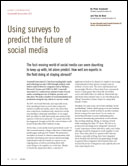 |
|
2009
A brief article addressing our social media research findings and a glimpse of the future. |
| |
|
|
| |
|
|
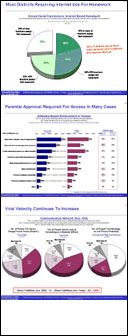 |
|
2008
A detailed study of family social media use and attitudes. The research is comprised of three parallel surveys with carefully constructed, nationally representative samples of 1,200 teens/children, 1,000 parents, and 250 school district-decision-makers. Kids’ Social Networking was underwritten by MySpace / News Corp., Microsoft and Verizon.
Topics covered include Internet use and attitudes, educational content, handhelds, advertising, and media tradeoffs. The market research license package provides an executive briefing with over 100 slides in a presentation-style report, more than 1,000 pages of cross tab tables, and access to raw data digitally delivered upon request.
Details »
|
| |
|
|
| |
|
|
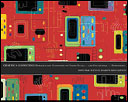 |
|
A public report from the National School Boards Association based on our Kids’ Social Networking Study. |
| |
|
|
| |
|
|
 |
|
2007
A public report from Alloy Media + Marketing based on our Social Media Study. It is intended for marketers and advertisers |
| |
|
|
| |
|
|
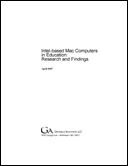 |
|
2007
Findings based on research we conducted for Apple Computer |
| |
|
|
| |
|
|
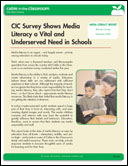 |
|
2006
A public report published by the National Cable Television Association’s Cable in the Classroom unit. The report is based on our survey of a stratified sample of 1,045 educators including teachers and library media specialists. |
| |
|
|
| |
|
|
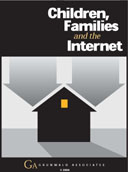 |
|
2003-2004
A market research report based on our study of children and parent use of technology based on four interrelated surveys. A telephone survey was conducted among a national Random Digit Dial (RDD) stratified sample of over 1,000 U.S. parents or guardians of children ages 2-17, and a series of three online surveys — two among children and one among their parents — was conducted to capture in-depth information about use of technology and media and related attitudes, among Internet-enabled U.S. family households.
This report predicted the emergence of social media powerhouses, and contained the first comprehensive analyses of new media psychographic categories such as online influencers.
Download brochure describing this market study, along with our news release on key market findings. |
| |
|
|
| |
|
|
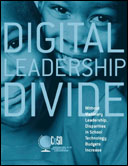 |
|
2004
A brief public report from the Consortium for School Networking based on our study of 455 school district decision makers for technology, such as superintendents, assistant superintendents, and directors of instructional technology, chief technology officers and administrators of management information systems. Additional research findings were presented at many education and industry conferences. |
| |
|
|
| |
|
|
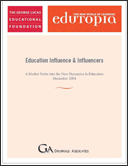 |
|
2004
A market research paper based on a survey of subscribers to Edutopia Magazine, published by the Lucas Foundation, establishing the nature and attitudes of education influencers and their widespread dissatisfaction with current educational practices. |
| |
|
|
| |
|
|
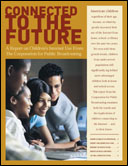 |
|
2003
A brief public report issued by the Corporation for Public Broadcasting, based on our Children, Families and the Internet 2003-2004. Among other findings, the report discusses the surge in under-served children and families starting to use the net. The CPB news release is also available. The study was underwritten by Kodak, BellSouth and the Educational Testing Service. |
| |
|
|
| |
|
|
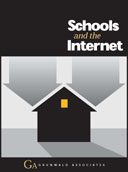 |
|
2002-2003
A market research report based on interviews with a carefully structured sample of decision-makers in 811 school districts (including 90 of the nation’s 100 largest). We explored topics ranging from how school technology buyers learn about products, to online education content, to the future of e-learning. This report contains the first substantial analysis of the impact of parents on school technology use and attitudes. Each chapter includes an implications and recommendations section.
Download brochure describing this market study » |
| |
|
|
| |
|
|
 |
|
2002
A brief public report issued by the National School Boards Association based on our Schools and the Internet study below. It was underwritten by AT&T, Plato Learning, and the Corporation for Public Broadcasting. |
| |
|
|
| |
|
|
 |
|
2000
Our pioneering media and technology survey of 1,700 representative families with children 2-17; telephone interviews with parents and many of the children. Findings cover media trade-offs and family use of the internet for both entertainment and education. This report contains the first substantial analysis of media multitasking, and describes the spread of subscription based services used by families.
The market research report is 138 pages, and is available for FREE; data book is more than 300 pages. |
| |
|
|
| |
|
|
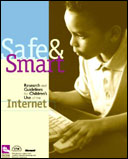 |
|
2000
A brief public report based on the CFI survey, issued by the National School Boards Association with underwriting from Sesame Workshop and Microsoft. |
| |
|
|
|